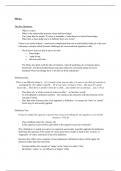Summary
Plato's Meno, Final Summary
This summary works through the debate between Socrates and Meno on the nature and acquisition of virtue. it seeks to build a foundational understanding of the arguments and refutations discussed within the text and some of the debates surrounding it since.
[Show more]



